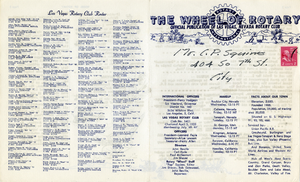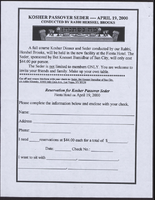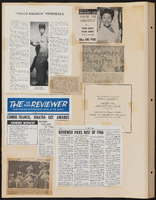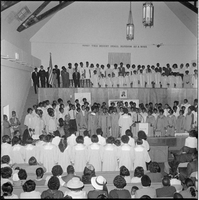Search the Special Collections and Archives Portal
Search Results

Transcript of interview with Jerry Engel by Barbara Tabach, March 1, 2016
Date
Archival Collection
Description
Jerry Engel was born in 1930 in New Jersey and spent most of his early life in Long Beach, New York until the family moved westward to Las Angeles. Jerry is a retired Certified Public Accountant and loves to talk about the history of Las Vegas that he observed since arriving in 1953. That was the year that he moved to Las Vegas to join his older brothers, Morris and Phil, in their accounting firm. Their major client at the time was Desert Inn. Another personal connection with local history: the Engel brothers? mother, Esther Katz Engel, was among the early investors in the Moulin Rouge hotel/casino enterprise. Jerry graduated with honors from University of California, Los Angeles in 1951. His accounting career in Las Vegas is highly regarded and he continues to maintain a consulting practice. He remains active within the community and enjoys doing presentations based on his memories of Las Vegas history. Within this interview, Jerry highlights people, casinos and other observations of local history that he came into contact with over the decades. He provides insights about the role of an accountant in the gaming industry. He also discusses the influence of Jewish business leaders in and array of local gaming and non-gaming issues, including the retail world, Jim Crow era segregation, and the astonishing growth of the valley over six decades.
Text

Transcript of interview with Glenn Tredwell by Barbara Tabach, March 4, 2016 and April 14, 2016
Date
Archival Collection
Description
In this interview Glenn Tredwell talks about his business ventures since moving to Las Vegas in 1976. He is able to address the many nuances of technology on the global gaming industry.
Text

Robin Greenspun oral history interview: transcript
Date
Archival Collection
Description
Oral history interview with Robin Greenspun conducted by Barbara Tabach on February 09, 2017 for the Southern Nevada Jewish Heritage Project. In this interview, Greenspun discusses her family background and growing up in Las Vegas, Nevada. She talks about her early interest in the arts, working in television productions, and becoming a film director.
Text

The Wheel of Rotary Las Vegas Rotary Club newsletter, March 30, 1950
Date
Archival Collection
Description
Text
Robin and Danny Greenspun oral history interview
Identifier
Abstract
Oral history interview with Robin and Danny Greenspun conducted by Michael Geeser on June 28, 1995 for the I Remember When: Recollections from Las Vegas Jewish Leaders oral history project. The Greenspuns discuss their different childhood experiences growing up Jewish in Las Vegas, Nevada. Robin and Danny each discuss their family histories briefly. They also discuss their philanthropy, specifically the CineVegas film festival. Finally, they discuss how they feel the Jewish community in Las Vegas is at the time of the interview, and how the next generation will grow and change the city.
Archival Collection
Shelley Berkley oral history interview
Identifier
Abstract
Oral history interview with Shelley Berkley conducted by Michael Geeser on January 9, 2006 for the I Remember When: Recollections from Las Vegas Jewish Leaders Oral History Project. Berkley talks about her career as a Jewish woman legislator, about growing up in Las Vegas, Nevada, and about issues such as Medicare, education, and Israel. She also answers questions from the audience.
Archival Collection
Burton Cohen oral history interview
Identifier
Abstract
Oral history interview with Burton Cohen conducted by Michael Geeser on November 14, 2005 for the I Remember When: Recollections from Las Vegas Jewish Leaders Oral History Project. He talks about his career as a casino executive, celebrities in Las Vegas, Nevada, the role of organized crime in the city, and about executives of other casinos. He also answers questions from the audience.
Archival Collection



